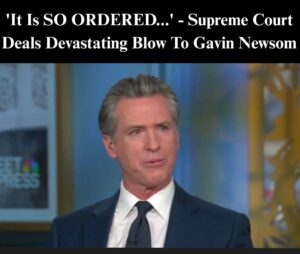Supreme Court Strikes Major Blow to California’s Electric Vehicle Plans

In a landmark 7-2 ruling, the U.S. Supreme Court has opened the door for energy companies to move forward with a legal challenge against California’s aggressive electric vehicle (EV) mandates—potentially derailing the state’s plans to phase out gas-powered cars by 2035.
Surprisingly, the decision saw one liberal justice side with the conservative majority, signaling broader judicial skepticism toward California’s climate regulations. At the heart of the case is a challenge to rules approved by the Environmental Protection Agency (EPA) that would require automakers to sell a growing percentage of electric vehicles in California, as part of Governor Gavin Newsom’s sweeping climate agenda.
Writing for the majority, Justice Brett Kavanaugh sharply criticized the regulatory framework, warning that it may have crossed legal boundaries.
“The government cannot impose burdensome and possibly unlawful regulations on an entire sector, then argue that those affected have no right to challenge it,” Kavanaugh wrote. “Based on longstanding precedents and the facts reviewed by the lower courts, fuel producers have standing to question the EPA’s approval of these California rules.”
Kavanaugh also drew attention to the EPA’s shifting legal interpretations over the years, suggesting this inconsistency weakened the agency’s defense.
“The EPA has changed its position several times on whether California has the legal authority under the Clean Air Act to enforce rules aimed at curbing greenhouse gas emissions from new vehicles,” he added.
The timing of the ruling is particularly significant. Just weeks earlier, former President Donald Trump signed a series of executive actions rolling back major elements of California’s climate policies. Those moves, seen as a direct challenge to Newsom’s environmental leadership, are being hailed by conservatives as a check on what they view as regulatory overreach.
Kavanaugh clarified that the case stems from a 2012 EPA waiver granted to California, which permitted the state to implement two specific rules: one capping the average emissions across all new cars sold in the state, and another requiring manufacturers to include a minimum number of EVs in their fleets.
Industry leaders have welcomed the court’s decision. Chet Thompson, president of the American Fuel & Petrochemical Manufacturers—the group spearheading the lawsuit—called the ruling a “game-changer.”
“This decision confirms that energy producers have the right to fight back against illegal EV mandates,” Thompson told The Daily Caller. “California has tried to use a misreading of federal law to push its own anti-gasoline agenda. Congress never gave them that kind of power.”
The Supreme Court’s decision adds to a growing list of legal challenges facing Governor Newsom, who is widely speculated to be considering a 2028 presidential run. In a separate but equally dramatic development, a federal appeals court ruled in favor of President Trump, allowing him to retain command over units of the California National Guard.
Trump, who deployed the Guard to Los Angeles to bolster federal property and support ICE operations, celebrated the decision on his Truth Social account:
“If I hadn’t sent the Guard to L.A., that city would be burning. We saved it. Thank you to the appeals court!”
The 9th Circuit Court of Appeals temporarily blocked a lower court ruling that had deemed Trump’s actions unconstitutional. District Judge Charles Breyer had previously ruled that Trump violated the 10th Amendment by federalizing part of the Guard for law enforcement purposes, claiming the move overstepped presidential authority.
But for now, both the Supreme Court and the appeals court have handed victories to Trump and his allies—setting the stage for a major clash over the future of state-led environmental regulation and presidential power.